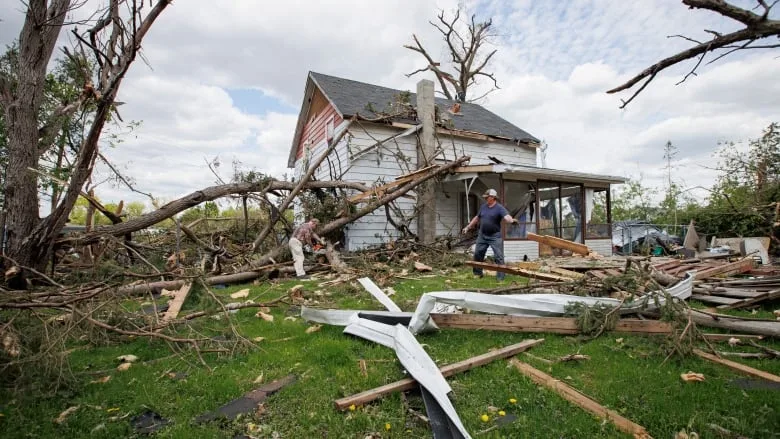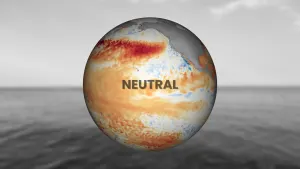
Derecho puts climate back on the Ontario election radar
The debate around highways and farmland rages as environmental groups analyze each party’s platform before voting day.
The astonishingly destructive and deadly storm that swept across southern Ontario and southern Quebec on May 20 focused the final days of the Ontario election on actions, and the current government’s failure, to address climate change.
Storms, and extreme weather in general, have been amped up by the enormous amount of additional heat in the climate system as a result of carbon emissions. Last Saturday’s storm, which killed at least 10 people and caused hundreds of millions of dollars in damages, is just one example of the record-smashing extreme weather the world is now experiencing.
Until the storm, affordability, housing, and the proposed Highway 413 were the big election issues, while climate was rarely mentioned. The Progressive Conservatives avoided the topic since their four-year track record includes cancelling renewable energy contracts, lost revenues from pulling out of the cap-and-trade program and legal fees that cost the province nearly $10 billion, according to a report by Environmental Defence.
The Ontario auditor general reported the Ford government made little effort to achieve its own weak carbon emission reduction target it set in 2018.
“It’s clear the Ontario Conservative Party is not interested in climate change,” said Nic Rivers, Canada research chair in Climate and Energy Policy at the University of Ottawa.
Instead, the Ford government has been a roadblock in Canada’s overall efforts to reduce emissions, Rivers said in an interview with The Weather Network (TWN).
In sharp contrast, a majority of Canadians, including those in Ontario, want their governments to take action on climate, he said.
This is true of Conservative voters as well, with 58 per cent saying they are very concerned or somewhat concerned about climate change, according to a February 2022 poll conducted by POLITICO and Morning Consult. For comparison, 90 per cent of NDP voters are very or somewhat concerned, with similar numbers for Liberal and Green voters.
Reflecting that strong majority, the Liberals, NDP, and Greens have said they will reduce Ontario’s emissions by 50 per cent compared to 2005 by 2030.
The three parties’ overall platforms on climate are quite similar, said Rivers; however, the NDP and Liberals lack detail on how their plans would be implemented. The Green Party has more detail and analysis in their plan and have made climate a top priority.
Rivers said while he was surprised at how vague many of the proposed NDP and Liberal policies were, any party that replaced the Conservatives in government would be a win for climate action in Ontario.
Green Prosperity survey
Ontario’s environmental groups surveyed the province’s political parties on climate and other environmental issues. Read the parties’ responses to specific questions here. (Note: the Progressive Conservative Party did not respond to any questions despite numerous attempts to engage them, according to one survey organizer.)
Housing affordability is a top issue but the Ford government has done little to address it, said Mike Moffatt, senior director of Policy and Innovation at the Smart Prosperity Institute. The government set up the Housing Affordability Task Force late last year, but hasn’t acted on the many recommendations.
“The Conservatives have the most restrictive housing policy of any of the parties,” Moffatt said in an interview with TWN. “If we don’t get housing right, it affects so many other things including climate.”
Conservative policies favor suburban sprawl housing that gobbles up farms and green space, is more costly to service, and makes effective public transit impossible, he said. Ontario’s largest source of carbon emissions is transportation, followed by the building sector — both commercial and residential.
The economic, social, and environmental problems resulting from suburban sprawl are well known. However, the Ford government has failed to direct municipalities to focus growth within their urban boundaries and increase the density of their communities, according to Moffatt.
Highway 413 — a proposed 60 kilometre-long highway running through York, Peel, and Halton Regions — will only make sprawl worse and increase carbon emissions, said Moffatt. The three other parties, many local municipalities, the National Farmers Union, and environmental groups all oppose the building of Highway 413.
A new government will have to make difficult decisions to address housing affordability otherwise nothing will change, he said.
At a time of skyrocketing food prices, paving over some of Ontario’s last high-quality farmland to build Highway 413 is going in the wrong direction, said Lana Goldberg, Ontario climate program manager at Environmental Defence. Local food security can help lower food prices in some communities, Goldberg said in an interview with TWN.
Much of the inflation in prices Ontarians are experiencing is the result of volatile oil and gas prices.
“The only way to get off that roller-coaster is to create sustainable communities that don’t require personal vehicles,” she said.
Wetlands, wildlife, and nature generally, has been far less protected under the Ford government, Goldberg noted. She urges voters to review the answers parties have given in the Green Prosperity survey to better understand each party’s values.
Thumbnail Image: Uxbridge, Ont., resident Allen Harrison cleans up his property after a tornado produced by a derecho swept through the southern Ontario town. (Evan Mitsui/CBC)










